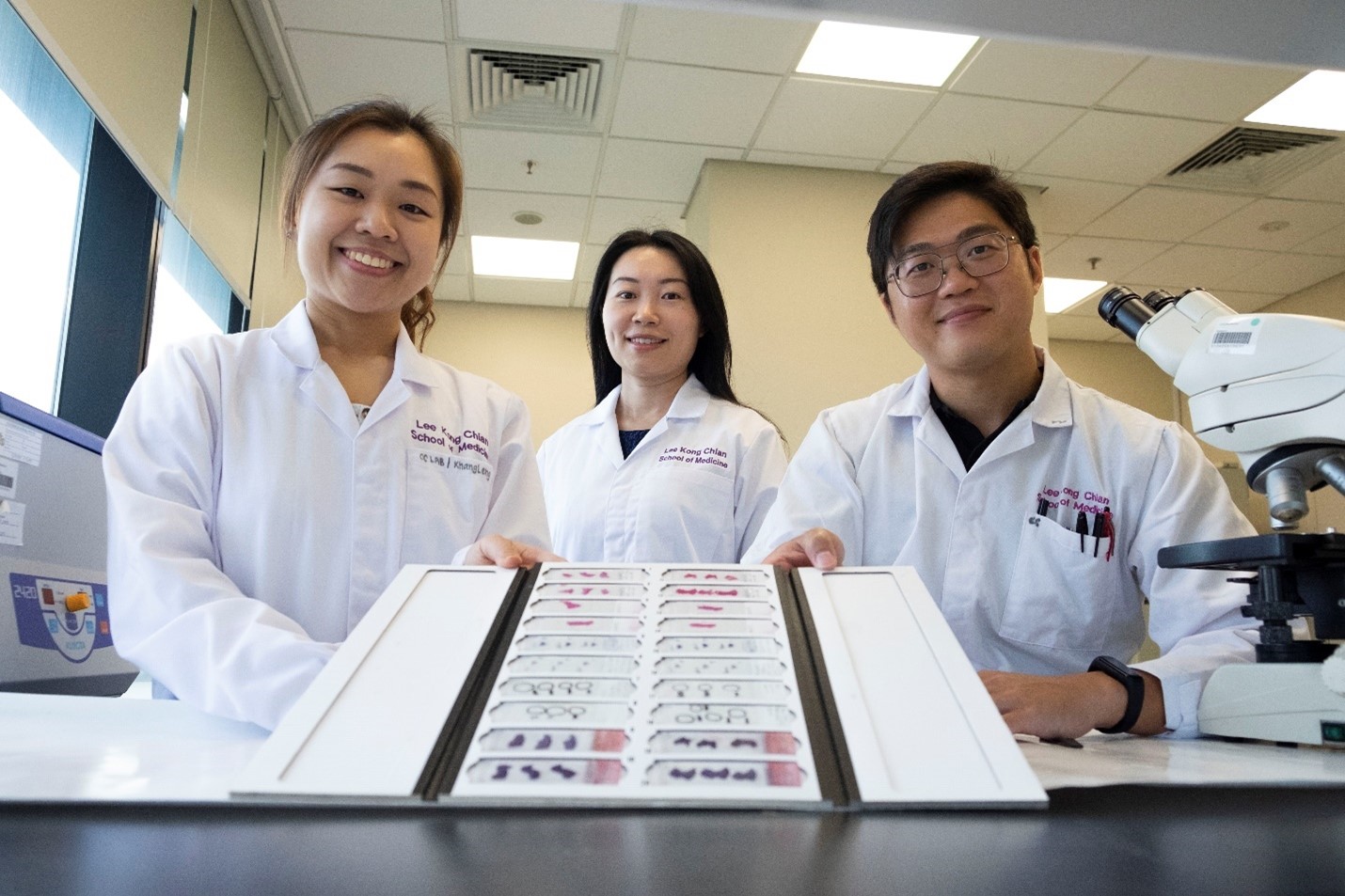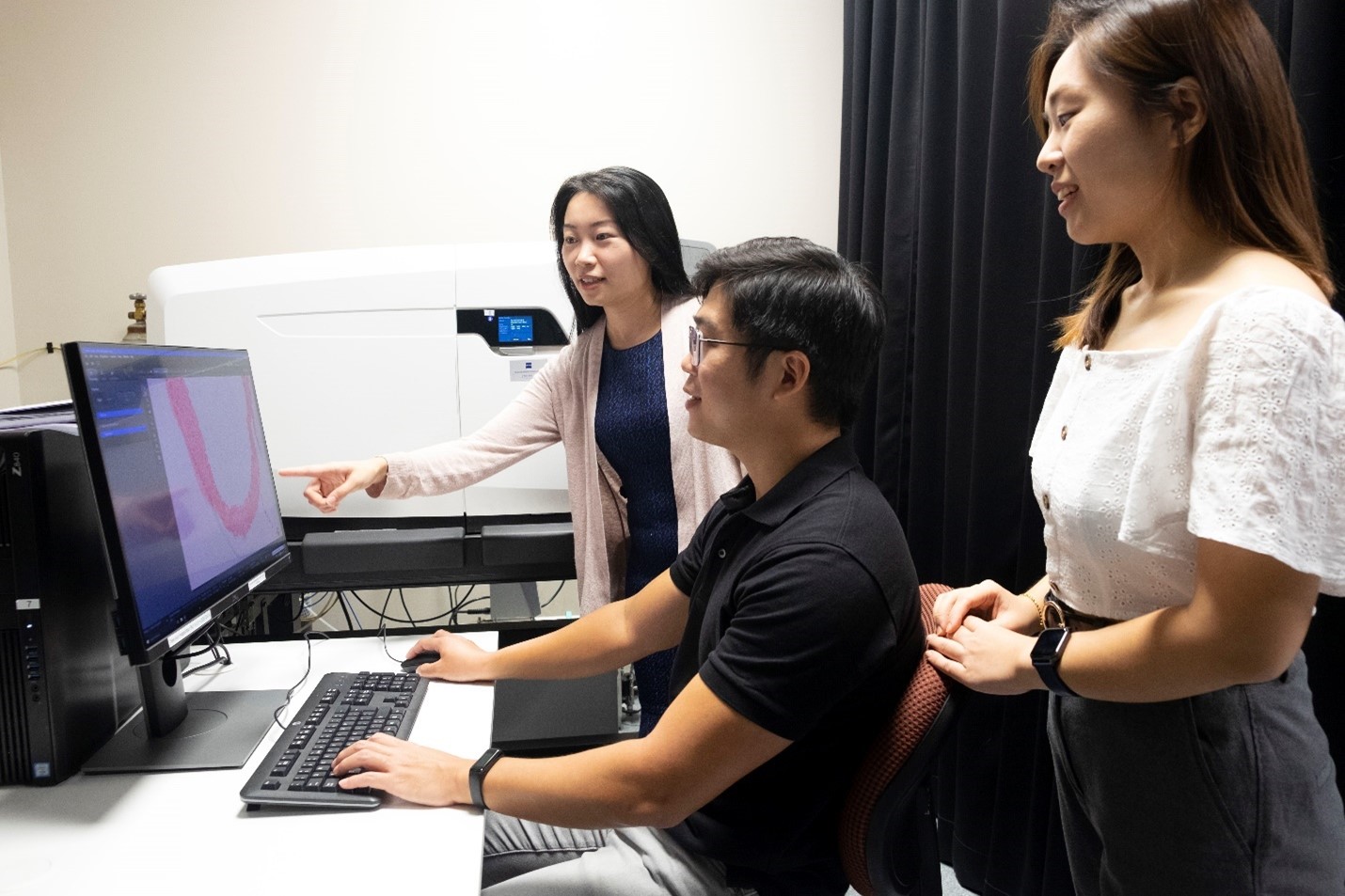Research: Study shows how non-alcoholic fatty liver disease increases risk of vascular diseases
 | By Sarah Zulkifli, Science Writer, Communications & Outreach |
Patients with non-alcoholic fatty liver disease (NAFLD) are at higher risk of cardiovascular disease, because NAFLD prompts the over-production of a class of proteins that cause inflammation and damage to their blood vessels.

From left: LKCMedicine Asst Prof Christine Cheung, LKCMedicine PhD candidate Lee Khang Leng, and LKCMedicine Research Fellow Dr Ng Chun-Yi
These findings by scientists from LKCMedicine and the National University of Singapore (NUS) shed light on why the leading cause of mortality in NAFLD patients is cardiovascular complications, instead of liver damage.
NAFLD is a general term for liver diseases affecting patients who drink little to no alcohol. It is mainly characterised by having too much fat stored in liver cells and can lead to liver cirrhosis and liver cancer.
It is estimated that up to 40 per cent of the population in Southeast Asian countries, including Singapore, have NAFLD.
The research team, led by LKCMedicine Assistant Professor Christine Cheung found a higher level of blood vessel damage in NAFLD patients, which increases the risks of blood clots and cardiovascular diseases.
Asst Prof Cheung said, “The growing prevalence of fatty liver disease globally is a concern. In Singapore, one in three is likely to develop non-alcoholic fatty liver disease over the next 10 years. These patients are at increased risk of developing vascular diseases, such as coronary artery disease and cerebrovascular disease. The good news is that liver disease, at its early stages, is reversible.”
The team, comprising researchers from NTU, the National University Health System and the Agency for Science, Technology and Research (A*STAR), published their findings in EMBO Reports in April.
Fatty liver disease associated with increased chemokine levels

The team recreated blood vessel cells from samples donated by 99 NAFLD patients and 56 healthy controls to be used as experimental models for the study. They found that the blood vessel cells of fatty liver disease patients contained higher levels of a class of proteins called chemokines – up to three times higher than in healthy individuals.
Chemokines are strong attractants of immune cells. Their main role in the body is drawing immune cells to sites of infections so that these cells can combat infections. However, when abnormally high levels of immune cells are recruited into a blood vessel, it becomes harmful.
In particular, the researchers noticed that a type of immune cells known as T cells were strongly responsive to the chemokines in NAFLD patients. T cells are an important part of the body’s immune system that fight against foreign particles. The researchers discovered that the higher level of chemokines in fatty liver disease patients was attracting T cells into blood vessel walls. These T cells then caused inflammation of blood vessels, damaging them.
Higher levels of damage and inflammation can lead to leakiness in the blood vessels, impairing blood vessels’ integrity over time and increasing the risk of blood clot formation. It can lead to devastating events if the blood flow to vital organs is obstructed, such as ischaemic tissue injury.
The team detected three times as many circulating damaged endothelial cells — cells from the inner lining of blood vessels that have been shed into the bloodstream — in fatty liver disease patients, which is a sign of blood vessel injury.
The researchers believe that fatty liver disease patients have increased chemokine production due to the higher levels of oxidised lipids and free fatty acids in their blood. The paper’s first author, LKCMedicine Research Fellow Dr Ng Chun-Yi, said, “Blood vessels are likely to be sensitive to the inflammatory mediators and abnormal lipid metabolism which underlie non-alcoholic fatty liver disease. We discovered that non-alcoholic fatty liver disease blood vessel cells are more ‘activated’, making them susceptible to vascular inflammation.”
Clinical collaborator and co-author Associate Professor Dan Yock Young from the Yong Loo Lin School of Medicine and the National University Health System said, “Non-alcoholic fatty liver disease goes beyond the liver, impacting multi-organ system and leading to vascular complications such as coronary diseases and stroke. This study demonstrates for the first time how the levels of circulating damaged endothelial cells differ between non-alcoholic fatty liver disease patients and nonpatients.”
“This opens new perspectives in our understanding of fatty liver diseases and therapeutic strategies for treating them. Instead of focusing narrowly on the liver pathology, a holistic approach in targeting the systemic inflammation of injured blood vessels has the potential to decrease the mortality rate of fatty liver disease patients,” added A/Prof Dan.
Informing better clinical care for patients
Understanding how NAFLD affects heart health should help to inform clinical care for patients, the researchers say.
Typically, patients who present with symptoms of fatty liver diseases are not commonly referred to cardiologists. However, as the team’s research has shown that chronic inflammation and damage to blood vessels can lead to heart disease, it might be prudent for a patient’s vascular health to be monitored as well.
Asst Prof Cheung said, “As we better understand the link between non-alcoholic fatty liver disease and vascular inflammation, the science helps to inform clinical care. Patients who seek medical treatment for liver disease, for instance, could be considered for vascular health check-ups. This way, doctors not only follow up on the liver health but potentially prevent vascular complications in the future.”
“Liver disease at its early stage is reversible with lifestyle changes such as exercise and a healthy diet. Lifestyle modification is key at an early stage to slow down the progression of both fatty liver disease and cardiovascular disease before they become too advanced for functional recovery,” added Asst Prof Cheung.
Speaking independently on the study, Professor Roger Foo, Zayed Bin Sultan Al Nahyan Professor in Medicine and Director of the Cardiovascular Disease Translational Research Programme at the Yong Loo Lin School of Medicine and Senior Consultant at the National University Heart Centre, Singapore said, “Non-alcoholic fatty liver disease is serious because if left untreated can cause significant and debilitating disease in the heart and walls of blood vessels. This work is important because, using samples donated from patients, the scientists have been able to map out new aspects of cellular crosstalk between cells of the vessel wall and the immune system, leading to a proposed fresh angle for treating the condition.”
The research team is now developing biomarkers for early detection of vascular damage in inflammatory and metabolic conditions.
Asst Prof Cheung is also a member of the Women in Science (WIS) initiative that was launched in August 2020 with the support of the School management board. The initiative aims at creating equitable opportunities for female and male scientists and empowering a new generation of women leaders in the field of life science and medicine.
|

